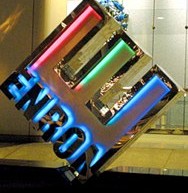Enron and Corporate Culture

I wrote this article a couple of years ago, before the Enron litigation had run its course. Since Enron has been in the news again, and since the arcticle is still popular on my business web site, I thought I'd share it on the blog:
We are still learning the facts about Enron’s corporate culture. But even now, it seems clear that the strengths and limitations of Enron’s culture led to its demise.For a video post-mortem on Enron and what went wrong, check out this link. Brad DeLong's perspective is admittedly political, but then, there's no apolitical stance in economics, actually, and his is an informed and intelligent perspective. He argues against the notion that Enron had been brought down by the actions of a few rogues, consistent with my old analysis, relating Enron's fall to a fundamentally flawed, corrupted corporate culture.
Individuals are responsible for their actions. As I write this article, it is not yet clear who did what, who knew what and whether or not any laws were broken at Enron. But unethical or illegal individual actions are sometimes symptoms of systemic problems, and Enron’s systems of accountability, oversight, ethical disclosure and corporate priorities were seriously flawed.
Enron’s corporate culture best exemplified values of risk taking, aggressive growth and entrepreneurial creativity. These are all positive values. But these values were not balanced by genuine attention to corporate integrity and the creation of customer - and not just shareholder - value. Because the Enron corporate culture was not well grounded, a single scorecard - maximized price per share of common stock - became its reason for being, and even its positive values became liabilities.
Enron’s corporate culture also seemed to embrace a value - massive size - that is not so much a value as it is a strategy through which to achieve a larger mission. This dedication to sheer size, left unchecked, made the company prone to use of its size to bully and intimidate those who, for example, questioned some its balance sheet practices. Enron became arrogant.
Once the values of risk taking and creativity led to more and more aggressive partnership arrangements to maximize share value and, for example, hide debt, the company failed to check its “creativity” with an equal commitment to integrity. I’ll bet many insiders came to believe Enron could not fail to grow - the company promoted the myth of its own invulnerability so effectively. That must have made it easy, at some point, for decision makers to secure risky partnerships with Enron stock, betting that the stock would never fall.
But then the bubble burst from the overheated, overvalued marketplace, and many of Enron’s speculative ventures sank. But as the market began to fall, so too did Enron’s stock, and then creditors required more than Enron stock as payment or security. The actual financial tools and processes were far more complex than this, but Enron essentially fall apart by a complex process of “margin calls.”
But before the end, it became more and more apparent to insiders that the bottom was falling out, which then led to more and more aggressive measures to prop up stock values by whatever means necessary - Enron’s corporate culture did not change. Corporate officers deceived shareholders and employees, as part of a pattern that apparently had developed, incrementally, over time.
But the death spiral had already begun, and Enron’s collapse became as inevitable as its true believers had once presumed its success to be.
As reports from inside Enron come out, it appears that many people were aware of the company’s questionable financial practices - aware also that Enron’s corporate culture was out of control. Whistle blowers are never very common, but a corporate culture that makes it hard for ethical objections to be heard - or which fails to take them seriously - is a corporate culture that is already failing. Otherwise ethical people remain silent when they see the most highly rewarded people in an organization are the ones who commit some of the worst violations.
That’s important, because one way to describe a corporate culture is that is is made up of the sum of the personalities of those people who are selected, promoted and rewarded in an organization. When a corporation fails to select for integrity in leadership, it certainly won’t find it there later.
Corporate officers at Enron seem at best to have been neglectful of their responsibilities for oversight, or, at worst, outright criminal and abusive in their levels of greed and deception. It takes a special person to blow the whistle in such an environment.
All of this was preventable, long ago, but Enron failed to create a sustainably successful corporate culture that included values such as customer service, or maximizing customer loyalty and satisfaction, which would have balanced the company’s overemphasis on pure, short-term stock price.
But even more important, Enron’s corporate culture had evolved so that it only paid cosmetic attention to integrity. That is and was the responsibility of the Board of Directors and the executive officers of the company. A well tended garden is never choked by weeds.
And that’s how corporate culture matters: the attention we pay to corporate culture pays dividends in creating sustainable growth and profit. Enron’s failure to create the right kind of corporate culture ultimately killed it.

<< Home